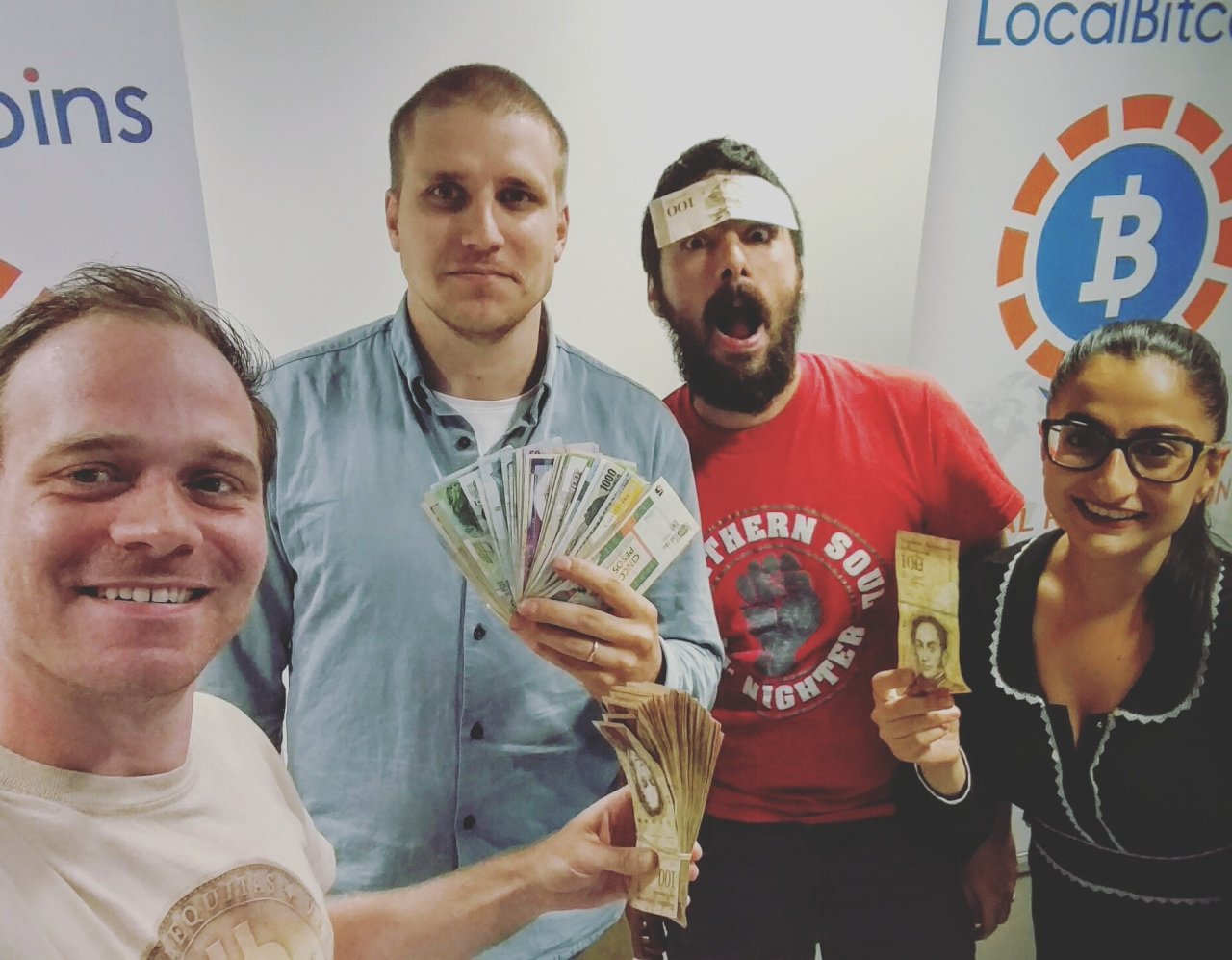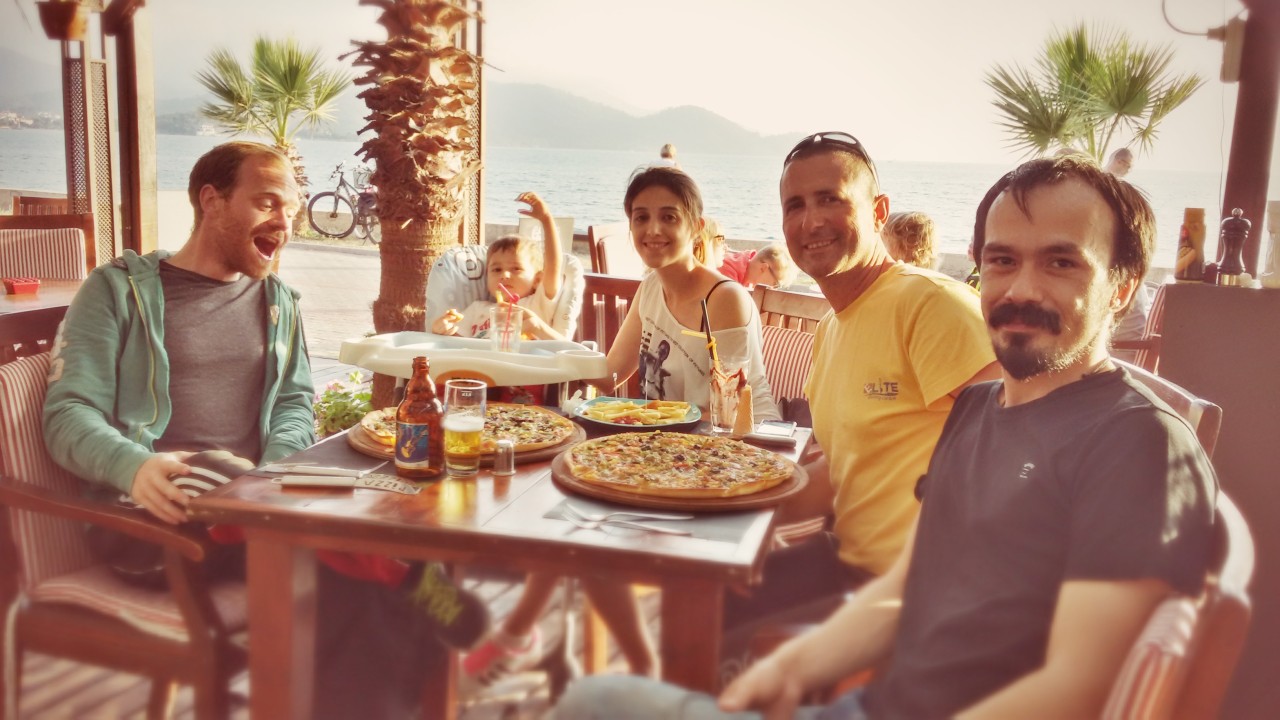Thank you @LocalBitcoins helping me find bitcoin for cash trades all around the world. 19 fiats / 27 countries.

Bitcoin Traveler
A round-the-world trip for 365 days - only on Bitcoin.Can you pay for paragliding in Turkey using Bitcoin in 2015? Also, my very first video :-)
Bitcoin in Prague: Paralelni Polis, SatoshiLabs
On Wednesday afternoon I have an appointment at the offices of SatoshiLabs. The company is the first to sell a so-called Bitcoin hardware wallet. A hardware wallet is an external USB device that stores the most sensitive data when it comes to Bitcoin: the private key.
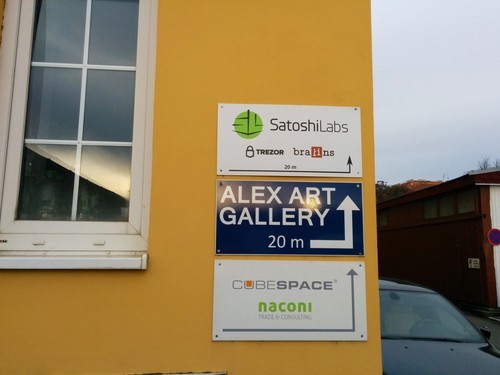
In the Bitcoin world, there are no real IDs, no cheques and no physical signatures. Instead there are Bitcoin addresses and corresponding private keys. To send Bitcoin to someone you only need to know one of their Bitcoin addresses (like a person’s email address). To approve the movement of the funds you provide a “digital signature”. To create this signature, you need to know the private key.
You can securely store millions of dollars’ worth of value in a Bitcoin address, if you make sure nobody except you knows the corresponding private key.
Unfortunately, a lot of Bitcoins have been lost or stolen in the past. However, this was never a fault of the Bitcoin system itself. Rather, it happened because of compromised computers and viruses that try and steal the private keys. A hardware wallet like the Trezor stores the private key on the external device, not your computer. This makes using Bitcoin in larger sums very secure.
When I arrive at SatoshiLabs Slush, Stick and Alena greet me. I know their faces from their entertaining kickstarter video. They were able to raise money for the first Trezors in 2013 and started shipping them in 2014. I didn’t preorder one back then; instead, I came all the way to Prague myself to buy my very first Trezor from Slush in person :).
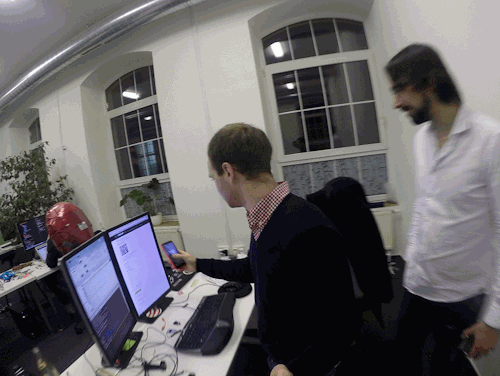
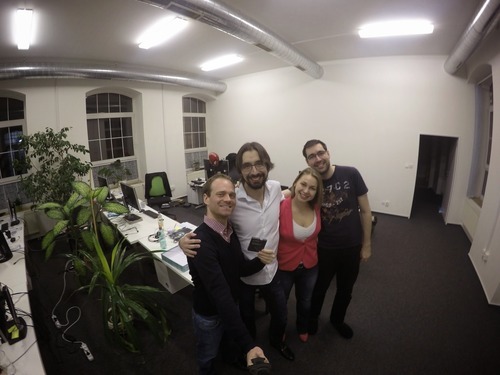
Later I interview them, but when I play the video back later I find the sound to be unusable. I look up an electronics shop to buy a more professional microphone. But I’m not in luck: there is no electronics store in Prague as of January 2015 that accepts Bitcoin.
Back at Paralelni Polis there are some people gathering for the KINO43 event. This is a weekly public event where they show different kinds of documentary movies with discussions afterwards. Today’s screening is the making of the movie “The Interview” and the infamous alleged hacking of Sony by the North Korean government at the end of 2014.
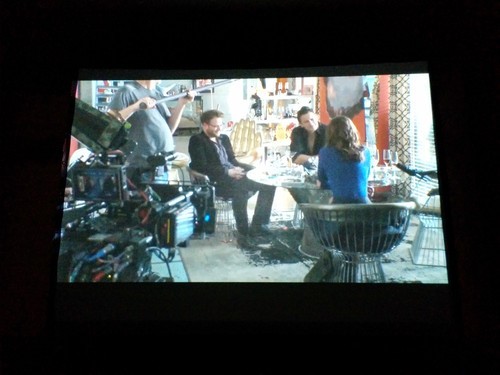
Later that night I meet Pavol Luptak, a security researcher, early Bitcoin enthusiast and founder of the hackerspace ProgressBar in Bratislava, Slovakia. Over dinner, we enjoy a lengthy discussion of Bitcoin and its potential and he talks about his role in the founding of the Paralelni Polis project. The food is very good traditional Czech food.

One thing I love so much about traveling is that you get to eat so many different dishes in all the different places. There is yummy food all over the world, for sure. I recommend always making sure you try the local food first. If you dont like it, you still can go back to pizza or pasta or whatever, but you might love it!
On Thursday I have lunch with the awesome people at SatoshiLabs and we redo the interview, which I will upload soon. When I go back to Paralelni Polis, there is a special event today called Disco Soup.
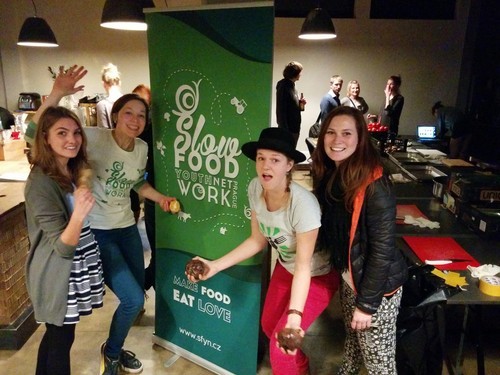
The project’s aim is to raise awareness about the vast amount of almost-perfect food that is thrown away everyday: just because the tomato has a small split, it doesn’t mean that it is not edible. People gather around a big table and chop vegetables to put in a big bowl of soup. Meanwhile, music is playing: the idea is, you should dance, have fun and cook in a big group at the same time (just be careful not to cut yourself).

Unfortunately, I can’t stay until the end of the cooking session because my train to Brno leaves at 8pm. Michael, my friendly host, takes me to the sation in his car and he tells me how the Breakup of Czechoslovakia in 1993 was completely peaceful. I can’t recall many separations in recent history that went like that. According to Coinmap.org, in Brno there is an apartment where the landlady apparently takes Bitcoin :).
My conclusion after four days of Prague: the Czech Bitcoin community seems to be very serious about the first digital currency. After all, the first Bitcoin conference in Europe was in Prague in November 2011. I was able to buy food in a restaurant that accepts Bitcoin, and I stayed in a place which is normally rented out on AirBnB but whose owner also accepts Bitcoin. Finally the Paralelni Polis is the first Bitcoin only accepting coffee place in the world. Wow! Living on Bitcoin for the first 4 days in Prague was super easy, I think to myself… but this is all about to change…

Very first lunch for Bitcoin with detours
Day 1, January 13, Prague
I slept well tonight although a little bit longer than I wanted to: it’s 12 noon already. Time to get lunch. I look on coinmap.org and find a place called “U3trojek” not too far away.
So, I walk to the location marked on my map. I’m a bit surprised not to find a “Bitcoin accepted” sign in the window near all the other payment methods, but I go in anyway. The owner is sitting in front of his laptop, and I ask him if he accepts Bitcoin. He looks at me and starts laughing: “Bitcoin? No, no, you cannot pay with Bitcoin here.”
Apparently I suck at reading maps: turns out I walked into the wrong restaurant. The owner points me to the other side of the street. “But I’m sure you cannot pay with Bitcoin over there either. If you can, you’ll get a free coffee on me.” But sure enough, in the other restaurant the sign is there. I’d like to ask the staff why they accept Bitcoin and since when, but unfortunately nobody speaks English. But with awkward gestures I’m still able to order and pay for the very first Bitcoin meal on my trip: pasta with mushroom sauce and spinach.


Afterwards I go back to the first restaurant, “MON AMI”, to claim my free coffee. Verdran, the owner, has already checked the website of U3trojek so he knows what I’ve come back for. But I also offer to buy some pancakes from him if he’s willing to take Bitcoin. Soon I’m explaining to him how to set up a Bitcoin wallet, and in less than 2 minutes he installs Breadwallet on his iPhone and receives the first Bitcoin payment for the pancakes. He is astonished at how fast it is and calls it “a historical moment”. Thank you, Verdran – your pancakes rock!
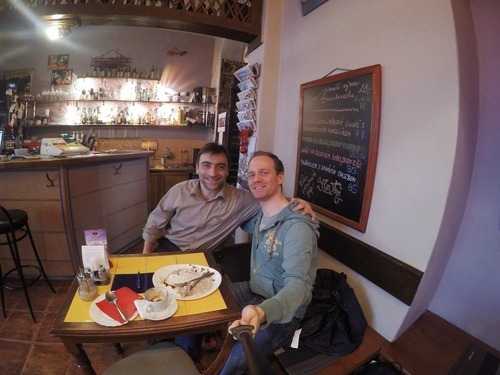
I continue my journey and visit some of the common sightseeing places here in Prague. It is definitely a very pretty city. I walk over the Charles Bridge (Karlův most). On the bridge there is a painter who draws caricatures. I always wanted to have one of me, but he doesn’t speak English and I have to pay him in Euro.
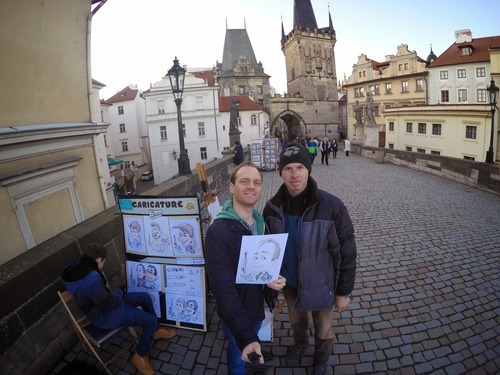
Finally I walk uptown towards Prague Castle where I enjoy a beautiful view of the whole city. Later I take the tram to the Paralelni Polis where the weekly Bitcoin meetup has already begun.

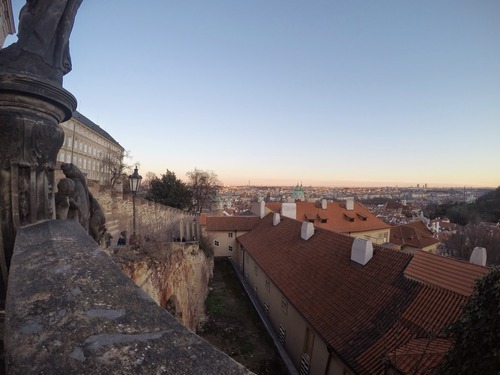
Around 30–40 people listen to the speaker whose talk is about different forms of money and how Bitcoin fits in. Unfortunately for me it’s in Czech, but the colored slides are still fun to watch.


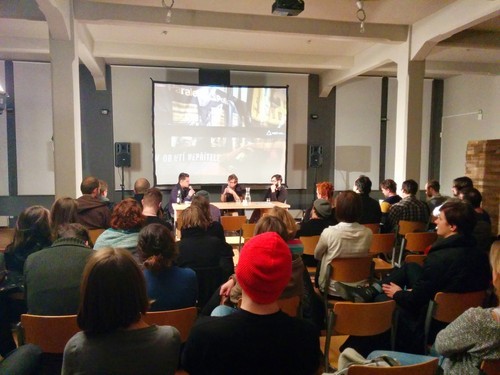
Later that night I meet Slush, one of the creators of the Trezor. The Trezor is the first Bitcoin hardware wallet. One attendee wants to buy himself a Trezor. What a good coincidence: I need some cash in the form of CZK and he needs BTC to buy the Trezor. We agree to trade at the current market rate of around 5,500 CZK per BTC. I don’t think I’ve ever traded Bitcoin so cheaply before…
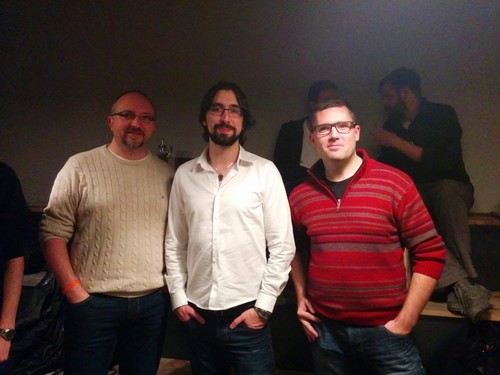
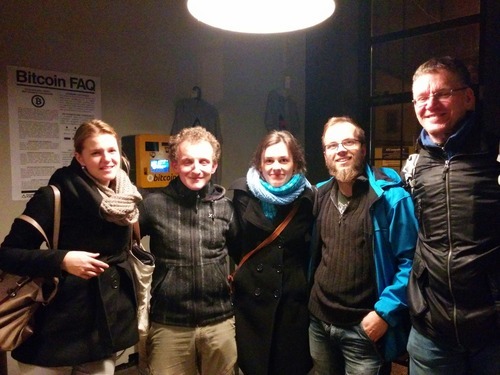
Even later that night I went to a club called CrossClub and partied a bit with a guy I met there called Michal. The DJ was okay, but the club’s decoration is definitely worth a visit.

Round-The-World Trip - 365 Days On Bitcoin
Hi my name is Felix, I’m a 27 years young programmer from Luxembourg a small country at the heart of Europe. Welcome to the Bitcoin Traveler’s Blog. I discovered the digital currency Bitcoin in 2012 and it took me quite a while to understand this new kind of money but eventually it has changed my life…
It’s January 12, 2015. The train leaves Berlin central station on time at 06:46 CET. It’s quite cold and I’m pretty tired since I didn’t sleep last night. Mainly because I’m super excited about the fact that I’m about to start my biggest adventure yet: a round-the-world trip for 365 days. And this is a challenging with a twist: traveling only on Bitcoin.
More about me and my motivation, the world trip, the challenge and Bitcoin itself will follow in one of my next posts.
The challenge basically boils down to 3 simple rules:
- Use Bitcoin whenever possible to pay for food, accommodation and travel.
- Never use a debit/credit card or ATM.
- Limited usage of cash in form of local currency is allowed, but can only be obtained by trading Bitcoin with local people.
I plan to blog about the trip in general, do interviews with other Bitcoiners and share my personal experiences and thoughts on the world’s first decentralized, P2P, digital crypto-currency ever. If you’re interested on what it’s like and/or possible to tour the world using Bitcoin in 2015 you can follow me on this blog as well as my twitter feed, instagram and youtube channel.
Felix
Day 0 - Prague and art project Paralelni Polis
To begin my trip I booked an Interrail ticket for 30 days. It’s a program here in Europe where you can take any train to visit as many countries and cities as you wish. Of course I paid for this ticket in Bitcoin, even though the Interrail Service does not accept Bitcoin directly yet. I used a service called all4btc which allowed me to pay in Bitcoin and still receive my ticket in the mail.
The choice of Prague for my first destination was easy: it’s a beautiful city and the gate to middle Europe culture. I also always wanted to explore eastern Europe and will continue in this direction for the next few days. Last but not least, Prague has a very big Bitcoin scene. As of January 2015, Coinmap.org lists more than 40 businesses accepting Bitcoin in Prague. One of them being SatoshiLabs: the guys behind Trezor, the first secure Bitcoin hardware wallet. And I want one!
As I’m writing these lines, the train is crossing the very first national border. I just received the obligatory SMS telling me the call and data roaming costs for the EU. Roaming in the EU was even more expensive a few years ago. I’ll leave this information here for historic purposes:
–
The roaming SMS says 0.29 EUR/Min for calling Germany and at least 0.75 EUR/Min for receiving calls here in the Czech Republic. Most important for me: the data prices are 0.23 EUR/MB unless I book a daypack (50 MB/24 hours at 2.95 EUR). As of the moment of this post, the Blockchain is about 28 GB in size. It would cost only 1,680 EUR to download the world’s most useful public database via phone.
Roaming costs in the EU are ridiculous. When I visited the USA last year I was able to travel thousands of kilometers without being charged different prices. In my opinion, roaming costs are a kind of customs charge – which should be not be allowed, according to the European Union Customs Union of 1958. They distort the free market because different telecoms companies cannot compete with each other (and don’t have to). Abolishment would lead to better prices for customers and better customer service. Finally, it would make all the different nationalities of people in Europe feel more united because it would reduce the feeling of being abroad.
–
I reach Prague at noon. Joerg Platzer from Room77 recommended that I visit Paralelni Polis. It’s an art project launched in October 2014 by an award-winning Czech guerrilla artist collective called “Ztohoven” and people from the Bratislav hackerspace “Progessbar”. Joerg was there for the opening.
When I arrived, there was another group of travelers: the European coffee trip. They travel across Europe to all kind of different cafés to find the best brew. Cool guys!
Paralelni Polis consists of the “Bitcoin Coffee” café, the co-working space “paper hub”, and a 3D printing space. Recurring events like Bitcoin meetups or the KINO43 screening are also part of this project.
Bitcoin Coffee is the first Bitcoin-only café in the world. You have to pay in Bitcoin. If you don’t have Bitcoin yet, there is a Bitcoin ATM at the entrance. You can use the Piper, a 1-Button Bitcoin Paper Wallet Printer, if you don’t have a smartphone. The friendly barista will also show you how to set up your wallet and use it for the first Bitcoin payment.
Victor, a young computer science student, shows me around the space and gives me a quick tour of the building. He explains that as well as the café, the co-working space also only accepts Bitcoin. Apparently, 80% of the customers have never used Bitcoin before, but are willing to try it out and most of them are surprised at how easy it is to use Bitcoin.
Tomorrow there will be a Bitcoin meetup. I dont speak Czech, but I can still follow the slides.
Later I meet Michal. He is 26 and one of the guys working for the Paralelni Polis Project now. He usually rents out a room on AirBnB. He likes my idea of traveling the world on Bitcoin and immediately offers the room – for payment in Bitcoin. I accept and we have coffee together. The coffee is 55 CZK (8.4 mBTC).
The room is quite large and I’m going to stay here 3 nights. They have a cat called Kočka, which is Czech for “cat”. Their creativity is sublime.
I’m falling to bed and am finally able to catch up on some sleep.
